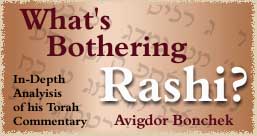

Back to this week's Parsha | Previous Issues
Parashas Lech Lecha
With your permission, I would depart from our usual subject, Rashi's commentary. I would like to point out an amazing, usually unnoticed, aspect of the Torah. Understanding the Torah's manifold levels of interpretation, one must notice not only WHAT the Torah says but also HOW it says it. Bereishis 14:12 "And they captured Lot and his possessions - Abram's nephew - and they left, etc." Look closely at this verse, what looks unusual? ANSWER: The word order is strange. We have what is called a misplaced modifier. The words "Abram's nephew" are out of place. It should have said, simply "And they captured Lot, Abram's nephew, and his possessions." Why the strange word order? Can you think of an explanation? Look over this whole chapter about Lot, his move to Sodom and eventually his capture and his being saved by Abram. Did you see anything unusual? Note and compare the following verses: 1) 12:5 "Abram took his wife Sarai and Lot his brother's son and all their wealth etc "; 2) 13:1 "So Abram went up from Egypt, he with his wife and all that was with him - and Lot with him - to the South." 3) Our verse 14:12 4) 14:16 "He brought back all the possessions; he also brought back his kinsman, Lot, with all his possessions etc." In #1 above Lot's relationship to Abram is stated next to his name and only afterwards "all their wealth." The relationship comes before their wealth. In #2 above, after Abram returns wealthy from Egypt his possessions ("all that was with him") separates him from Lot. As it says "So Abram...and all that was with him and Lot..." In #3 above, after Lot left Abram to develop his own business in Sodom, and was captured with the other residents of Sodom, we see how his possessions come between him and his relationship with his holy uncle. In #4 above we see that Abram went and saved his nephew, Lot. Abram did not see their possessions as standing in the way of (in between) their relationship ("his kinsman Lot" and only later all his possessions). I see this as a truly amazing technique which the Torah uses to express the main theme of this chapter, which is Lot's leaving the sanctity of Abram's presence for his personal material gain. The Torah by placing "the possessions" in different places in these verses we see the theme - Lot let his desire for possessions to stand in the way of his relationship with is uncle. Abram on the other hand did not let his possessions interfere with his desire to save his nephew (see #4). There are other instances in the Torah where the order of words is used to express a message beyond words. For examples see my book "Studying the Torah: A Guide to In-Depth Interpretation" published by Jason Aaronson Publishers.
Back to this week's Parsha | Previous Issues Permission is granted to redistribute electronically or on paper, provided that this notice is included intact.
For information on subscriptions, archives, and
http://www.shemayisrael.co.il |